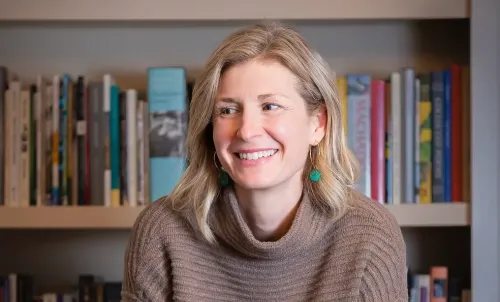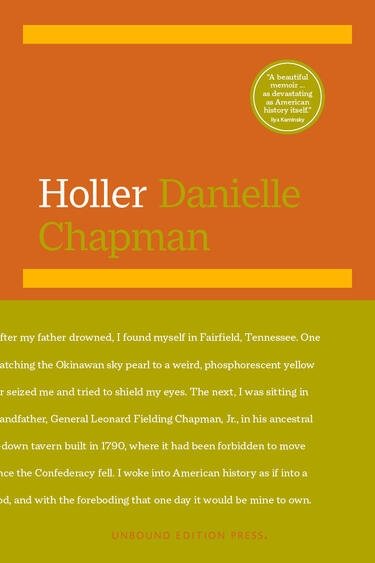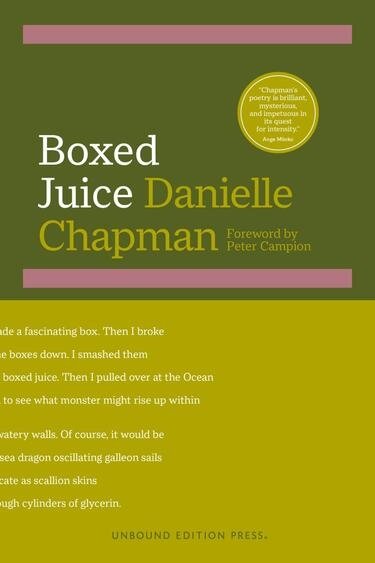FAS Poet’s New Works Wrestle with – and Transcend – Despair
In a new memoir and poetry collection, FAS lecturer Danielle Chapman uses fierce empathy and a moral imagination to come to terms with personal and historical tragedy.

This has been a busy year for Danielle Chapman, whose memoir, Holler: A Poet Among Patriots, was released from Unbound Edition Press last fall, and whose poetry collection, Boxed Juice, also from UEP, comes out on October 8. Both works contend with dichotomous themes such as hope and despair, speaking out and silence, and “blessedness-in-forsakenness.”
In Holler: A Poet among Patriots, Chapman uses an empathetic but critical eye to reveal the authentic people who loved her – and appalled her. A novelistic memoir written by a poet, Holler is divided into portraits that examine the Deep South, the people who live there, and the long history of racial violence and injustice. A difficult, brilliant book, Holler explores the inheritance of historical trauma that needs to be faced to be understood.
Boxed Juice, Chapman’s poetry collection, explores what it’s like to search for meaning and joy while living through a devastating cancer diagnosis. Chapman’s language is fresh, intense, and alive, challenging readers to adjust their perceptions of the nature of personal tragedy.
Danielle Chapman, Lecturer in the Department of English in the Faculty of Arts and Sciences (FAS), spoke with Natalie DeVaull-Robichaud of the FAS Dean’s Office about her new books and what she hopes readers find within them.

Let’s start with Holler. As a poet, what brought you to write a memoir?
Chapman: I’ve long been haunted by people and memories that seemed to be contained by the culture of my childhood, which was not so much one of poetry but one of storytelling. Storytelling in the South is primal, and often the stories aren't entirely true. There's an element of exaggeration to make it a good story. That's very much what I grew up with.
In the past, I did try to write some of the pieces as fiction, but because one of the book’s primary aims is to wrestle with my own American history, in the end I felt that I had to force myself to reckon with facts, personal and historical.
The first pieces I wrote, which came out whole, were the portraits of people. It was as if those personalities possessed me a little bit. It was an odd experience to write them – almost like writing a poem. It felt inspired, partly because it was as if I'd accessed my child's brain – the way that I felt about them and the way that I remembered them before I judged them. One reason it took me so long to write the book is because each chapter layers those memories with my adult reaction and then attempts to understand that tension and, in some way, resolve it.
Could you talk about your title, Holler: A Poet Among Patriots? What sort of tension exists between being a poet and being a patriot?
Chapman: I was happy when I landed on “holler” because it has several different meanings.
The concrete meaning is a marshy area that we also called “the boondocks” – a space between the house and the river: a no-man's land that resonates symbolically in terms of the place you're not supposed to go and the thing you can't talk about.
Of course, “holler” also has the exact opposite meaning, which is hollering out. That felt like it made sense in terms of confronting the silences that I grew up with – particularly the military silences, which exist because you need to grin and bear it. In military culture, there's a silence around any kind of difficult emotion or tragic circumstance. Stoicism demands that, even if you honor the dead and you honor the serious things that happen, you don't really talk about them, and you certainly don't cry about them.
But “holler” is also Marine-like in a way. As I got further into the book, I started recognizing other people's silences, including those of the Marines who I was writing about. I started hearing their hollering—their emotions, their sufferings, the things that they'd been through and hadn't been able to talk about because so many of them had PTSD without it ever being named, and for that reason their stories were often not known or told.
William Wordsworth's definition of a poem is “the spontaneous overflow of powerful feelings” – which is the opposite of the kind of stoicism that I grew up with, so there’s a lot of built-in tension there.
Can you discuss what you mean by “negative capability” in Holler?
Chapman: Empathy is a kind of easy word these days. But I think that your empathy is really tested when you try to feel for somebody who, in some way, appalls you. That was the case with a lot of these people in my book. John Keats used the term “negative capability” to describe Shakespeare as a great thinker who was able to rest into “uncertainties, mysteries, doubts, without any irritable reaching after fact and reason.” But it’s become almost a survival skill in 2024, when half of American humans see the other half as acting inhumane in some part of their life. For my part I couldn’t fully demonize the “other side” and still be honest because I remembered how much these people loved me and took care of me, and that created a moral and writerly dilemma.
What does it mean to fiercely love somebody and to have been loved by somebody throughout your childhood who is, in our lingo, problematic? And if a person is a problem, what does that primal memory mean? What does that person mean? We've gotten to a point in our culture where we think if somebody's problematic, you better get away as fast as you possibly can, even if you’ve been profoundly shaped by them. In many ways it’s a very similar conundrum to the one that J.D. Vance faced, but my solution is rather opposite to his, creatively and politically—a kind of anti-Hillbilly Elegy!

There’s a third-person essay at the very center of Boxed Juice. Can you talk a little about your reasons for fitting this essay into your poetry collection?
Chapman: I started to think of “Anyway in Spring” as a poem rather than an essay when I realized that it wasn't a narrative or argument that was driving it, but the way the prose blocks compress the memories, forcing their life to the surface. Then, in the final section, that becomes literal when the parents sit in a deer blind with their small children to spot (and rejoice at) nature, without telling them that it is a structure actually meant for hunting. The deer blind’s purpose is dark, but it is being used, willfully, as a way to get a clearer view of life. When that image arrived, I realized that the essay was actually a poem, and I’d found the end of it.
But also, I hope that piece works as a literal backdrop to some of the emotional and metaphysical currents that run through the whole book. It offers a practical grounding through prose descriptions of the situation that is the book’s primary tension: a woman who has two small children when her husband has been diagnosed with lymphoma has to deal with the vertigo of experiencing intense joy and intense fear at the same time.
The phrase “blessed-in-forsakenness” (47) occurs to the protagonist when she’s pregnant with twins while her husband is receiving treatment for cancer. Can you share your thoughts on how something or someone can be both blessed and forsaken and how this concept may work thematically in your book?
Chapman: It is a spiritual idea. The words that Christ says on the cross right before he dies are, “Oh God, oh God, why hast thou forsaken me?” Easter – or any idea of life – is not possible without that horrible suffering. That notion of suffering containing a seed or possibility of joy or new life – that's something that goes all throughout my work. I'm not a theologian, but I think of blessedness and forsakenness being inextricable. And in this poem, there’s almost a sense of being blessed by forsakenness. Which is kind of a terrible idea, because you don't ever want to say to anybody or to yourself: You're lucky for having that suffering. You're lucky for having to go through a cancer diagnosis. That's not true, and yet it is kind of undeniable that when you are in the midst of great suffering, the joy in your life can sometimes be closer and clearer. That's another thing that I hope happens in that middle poem – I hope the reader finds a hyper-clarity to the possibility that lies within this really difficult situation.
Would you like to speak about your choice of the title Boxed Juice, or would you like the reader to reflect on this themselves?
Chapman: There’s a poem called “Optimism” in the book. It starts: “I made a fascinating box. Then I broke / some boxes down. I smashed them / into boxed juice.” The idea comes from the effort required to make poems or to make anything out of life and the situations that you're given.
I like to tell my students that often people think of poetry as being self-expression, but the word “express” has more than one meaning: it doesn’t mean to just “say what you feel.” It also means to press something, like the way you express olives into olive oil. It’s the idea that, if you really put a lot of pressure on something, it will release its essence. That's what I'm trying to get at.
The title also alludes to Gerard Manley Hopkins, who went into these manic, exultant moods. He has a poem called “Spring,” which starts, “Nothing is so beautiful as Spring – / When weeds, in wheels, shoot long and lovely and lush.” And then a little later, “What is all this juice and all this joy?” I love that poem, and I love the question of where this joy comes from, and where its opposite comes from, because you can feel that he's feeling joy against the backdrop of an almost otherworldly anguish.
What would you like readers to take away from Holler and Boxed Juice?
Chapman: I hope that readers of Holler find this place and these people as indelible as I do, and that the book shows that telling the truth about the past is not only a necessary act but a hopeful one. It’s not saying, “Let's go back to doing things the way that my ancestors did,” but it's fully remembering them – historically, emotionally, imaginatively – while wrestling with and atoning for our inheritances in a way that makes room to imagine what's next – whether that is in terms of how we think about the South, how we think about the military in America, how we think about race and relationships between people of different races and who are connected historically. All of us in this country have inherited a very difficult yet incredibly interesting history, and we need ways to not only lament – which is necessary – but to imagine where we're going.
As for Boxed Juice, I hope it has some pleasures in it. I hope that it can answer that deeper kind of hunger that people bring to poetry. Or maybe I should say: I hope that it quenches some thirst!
Danielle Chapman is Lecturer in English in the FAS. Her memoir, Holler: A Poet Among Patriots, is available from Unbound Edition Press; her new poetry collection, Boxed Juice, will be available from Unbound Edition Press in October 2024.
The FAS Dean's Office announces new books to the FAS community and beyond. FAS faculty can inform us of their book’s publication through this webform.